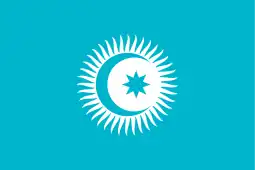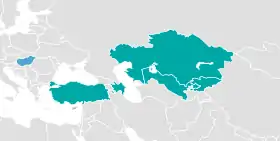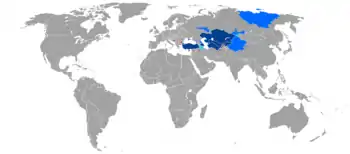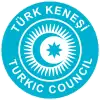TURKPA
The TURKPA in full, the Parliamentary Assembly of Turkic-Speaking Countries, is an international organization comprising some of the Turkic countries. It was founded on 21 November 2008 in Istanbul. The General Secretariat is in Baku, Azerbaijan. The member countries are Azerbaijan, Kazakhstan, Kyrgyzstan, Turkey, and Turkmenistan. Since late 2018, Hungary is an observer.[2][3]
Parliamentary Assembly of Turkic-Speaking Countries (TURKPA) | |
|---|---|
 Flag | |
 Members Observer States | |
| Headquarters | |
| Official languages[1] | |
| Member states[2] | |
| Leaders | |
• Chairman-in-Office | Mustafa ŞENTOP |
| Establishment | 21 November 2008 |
| Area | |
• Total | 3,794,962 km2 (1,465,243 sq mi) |
Website turk-pa.org/ | |
| |
History
Parliamentary Assembly of Turkic-Speaking Countries (TURKPA) was established on November 21, 2008, according to the Agreement signed by the Heads of parliaments of the Republic of Azerbaijan, Republic of Kazakhstan, Kyrgyz Republic, and the Republic of Turkey in the «Dolmabakhche Saray» located in Istanbul city, Republic of Turkey. On September 29, 2009, the 1st plenary session of the Parliamentary Assembly of Turkic-Speaking Countries (TURKPA) was conducted in the capital of the Republic of Azerbaijan Baku city. The TURKPA Regulations, Articles of Secretariat and Baku Declaration, and Statement regarding the permanent accommodation of the Secretariat in Baku city were adopted at the plenary session. The TURKPA Chairmanship annually hands over from one country to another by means of rotation in the English alphabetical order. The TURKPA Secretariat is the authority located in the capital of the Republic of Azerbaijan Baku city and has the status of international organization.[2]
Mission and objectives
Since 2010, TURKPA missions observe presidential and parliamentary elections and referendums in its member countries – Azerbaijan, Kazakhstan, Kyrgyzstan and Turkey. The mission includes members of the parliament of TURKPA member states, as well as representatives of the TURKPA Secretariat. TURKPA observers' mission holds meetings with high-ranked officials of the Central Election Commission and government officials. TURKPA mission monitors voting process at all stages - visits polling stations, estimates the preparation process, has conversation with voters and representatives of the polling station, meets with the officials and representatives of political and public organizations.
The observers follow the objectivity, justness, transparency and impartiality principles confirmed in Code of Conduct for International Observers approved in 2005 by the United Nations Organization, recommendations of Venice Commission of the Council of Europe and other international legal instruments. Observation missions hold press conferences on the conclusions of the elections and referendums.[2]
Main goals
• Assistance in development of political dialogue between the countries by means of parliamentary diplomacy as the qualitatively new stage of inter-parliamentary cooperation;
• Harmonization of the legislations and strengthening mutual activities with regard to other issues relating to the parliamentary cooperation on the basis of historical, cultural, and language unity.
• Assistance in development of solidity of mutually advantageous and equal cooperation between the turkic speaking nations and countries of other regions;
• Recommendation on approximation of legislations of the countries, including legislation on preservation and transfer to the future generations of cultural heritage and values of history, art, literature and other areas which are of importance for Turkic countries;
• Assistance in development of political, socio-economic, cultural, humanitarian, legal, and other relations among the parties;
The Parliamentary Assembly of Turkic-speaking Countries selected as its primary goals the principles of independence; sovereignty; territorial and state boundaries integrity; legal equity; mutual respect grounded on the principle of non-interference in internal affairs of each other; strengthening of political and economic security of the countries on the grounds of refrainment from threat or use of force or economic or any other pressure; growth of national prosperity by means of full and rational use of natural resources; endeavour to the new progress in the sphere of parliamentary diplomacy, establishment of new relations and development of the existing ones with parliaments and other international organizations of the countries in the region and all over the world.[2]
Affiliated bodies and organizations

The Turkic Council functions as an umbrella organization for all other cooperation mechanisms like:
- the Cooperation Council of Turkic-Speaking States (Turkic Council) (administrative capital, Baku)
- the International Organization of Turkic Culture (TURKSOY) (administrative capital, Ankara)
- International Turkic Academy (administrative capital, Astana)
- Turkic Cultural Heritage Fund
- Center of Nomadic Civilizations (administrative capital, Bishkek)
- Turkic Business Council (administrative capital, İstanbul)
International cooperation
TURKPA is an observer at the Conference on Interaction and Confidence-Building Measures in Asia and Asian Parliamentary Assembly.[2]
Members
Current
| Country | Population[4][5] (2018) | Area (km2) | GDP (nominal) 2013[6] | GDP per capita (nominal) 2013[7] | Projected GDP per capita (nominal) (2019)[7] |
|---|---|---|---|---|---|
| 9,949,537 | 86,600 | $74 billion | $7,812 | $11,674 | |
| 18,319,618 | 2,724,900 | $232 billion | $13,509 | $20,609 | |
| 6,304,030 | 199,900 | $8 billion | $1,280 | $1,898 | |
| 82,340,088 | 783,562 | $822 billion | $10,721 | $13,301 | |
| 5,850,901 | 488,100 | $48 billion | $8,020 | ||
| 118,843,816 | 4,283,062 | $1184 billion |
Past and Future Population
- List of countries by past and future population provide 1950, 2000 and 2050 population while year 2100 data is from the United Nations.
| Rank | Country | Area | 1950 | 2000 | 2050 | 2100 |
|---|---|---|---|---|---|---|
| 1 | 783,562 | 21,122,000 | 65,970,000 | 89,291,000 | 87,983,000 | |
| 2 | 447,400 | 6,293,000 | 25,042,000 | 35,117,000 | 32,077,000 | |
| 3 | 2,724,900 | 6,694,000 | 15,688,000 | 22,238,000 | 24,712,000 | |
| 4 | 86,600 | 2,886,000 | 8,464,000 | 11,210,000 | 9,636,000 | |
| 5 | 199,900 | 1,739,000 | 4,938,000 | 7,064,000 | 9,046,000 | |
| 6 | 488,100 | 1,205,000 | 4,386,000 | 6,608,000 | 5,606,000 | |
| Total | 4,730,462 | 39,939,000 | 124,488,000 | 171,528,000 | 169,060,000 | |
Land and Water Area (Exclude Caspian Sea)
EEZ+TIA is exclusive economic zone (EEZ) plus total internal area (TIA) which includes land and internal waters.
| Rank | Country | Area | EEZ | Shelf | EEZ+TIA |
|---|---|---|---|---|---|
| 1 | 783,562 | 261,654 | 56,093 | 1,045,216 | |
| 2 | 447,400 | 0 | 0 | 447,400 | |
| 3 | 2,724,900 | 0 | 0 | 2,724,900 | |
| 4 | 86,600 | 0 | 0 | 86,600 | |
| 5 | 199,900 | 0 | 0 | 199,900 | |
| 6 | 488,100 | 0 | 0 | 488,100 | |
| Total | 4,730,462 | 261,654 | 56,093 | 4,992,116 | |
List of Secretaries-General of the Turkic Council
| No. | Name | Country of origin | Took office | Left office | Note |
|---|---|---|---|---|---|
| 1 | Halil Akıncı | ||||
See also
References
- "Turk Dili Konusan Ulkeler Isbirligi Konseyi'nin Kurulmasina Dair Nahcivan Anlasmasi" (PDF). Turkkon.org. Retrieved 2014-03-05.
- "TURKPA Official Web Site". turk-pa.org. Retrieved 2019-06-15.
- "Hungary is now part of the assembly of "Turkic Speaking Countries"". Hungarian Free Press. 2018-11-25. Retrieved 2019-06-01.
- ""World Population prospects – Population division"". population.un.org. United Nations Department of Economic and Social Affairs, Population Division. Retrieved November 9, 2019.
- ""Overall total population" – World Population Prospects: The 2019 Revision" (xslx). population.un.org (custom data acquired via website). United Nations Department of Economic and Social Affairs, Population Division. Retrieved November 9, 2019.
- "GDP (current US$) - Data". Data.worldbank.org. Retrieved 25 August 2017.
- "Report for Selected Countries and Subjects". Imf.org. Retrieved 25 August 2017.
- "GDP (current US$) - Data". Data.worldbank.org. Retrieved 25 August 2017.
- "Press Release of the Sixth Summit of the Turkic Council". Turkic Council. Retrieved 2018-09-04.
